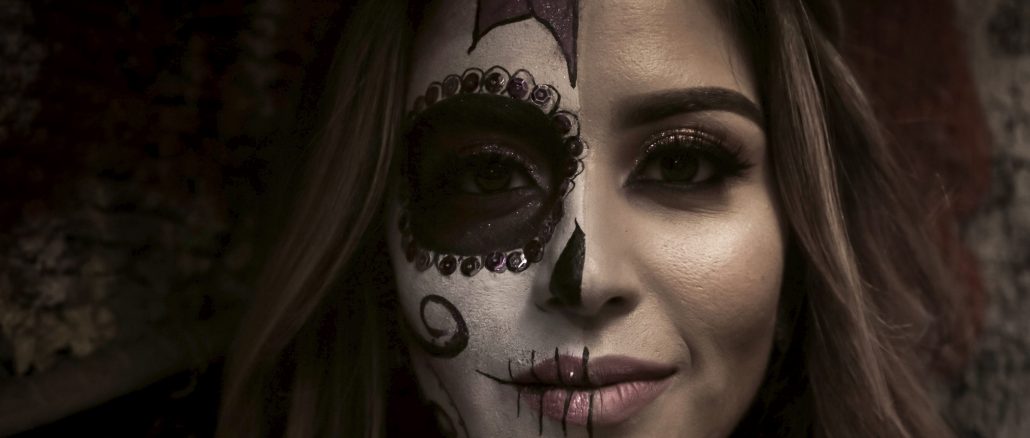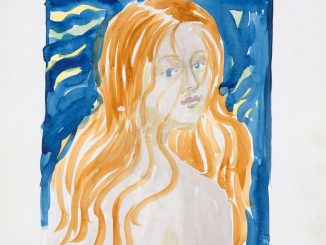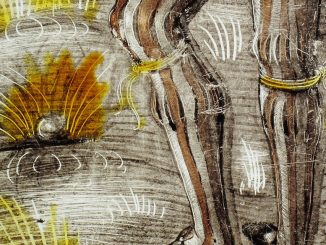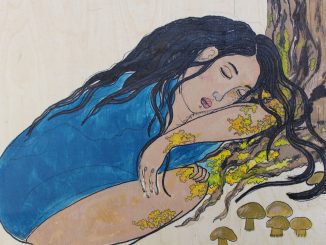
I don’t remember when I stopped going back to the drawer. The first time I saw the pot of gold inside it, I was six years old. I had woken up in tears that night. They made my face feel clammy and hot, as if I had just been slapped by a volcano. All I saw was darkness. Shadows that slid through my windows. That moment in the middle of a dream when you try to claw your way out. I felt this need to see my mother, I knew she was hurt in my dream, I knew a part of me realized it could happen in real life. What if it had already happened? Maybe my mother had been dragged under her wooden bed by the boogeyman, or a burglar had finally crawled from the garden, through my window, and into my room. Maybe the dark figure had done something to my mother. That must have been why I was afraid for her life.
When I woke, all I saw were the greenish glow-in-the-dark stars I had stuck to the ceiling. I could not bring myself to glance down to the window in front of my bed. I was sure that if I did, I would see a dark figure outlined against the white lightbulbs my father had just installed in the garden. If I turned my head right, to the closet, I would see my dolls crawling down the drawers towards me. I couldn’t move. Even the outline of the rocking chair perched next to my bed seemed to be in motion, a wooden monster ready to attack. All I felt was a hole where my stomach used to be. If I got out of bed really quickly, the Thing wouldn’t catch me before I slammed my parent’s wood door in its face. My room was only a hallway away from my parent’s room. I ran.
Whatever image pushed me out of sleep, my stomach fell to the ground and dragged behind me as I ran out of my room. Somehow, my dream had confirmed the impossible. A horrible notion that my mother would one day die took over my mind. The idea that one day I would have to figure out how to live alone was even worse.
I ran out of my room and immediately turned left, then a sharp right. There she was in her bed. My mother. My parent’s room was not much bigger than my own, but their window led to the main garden—big and showered in moonlight—while my own led to the back garden—artificial light and a dark green wall separating us from our neighbor’s house. The bedsheets my mother lay on were pure white under the light of the moon coming in through the curtain-less window. They must have been the softest cotton because they pulled me into them as an ocean wave retrieves the seashells lost on shore. My mother woke up to me shoving her body back and forth as hard as I could. She grabbed my face in her hands and stroked the tears away from my eyes.
“Que pasa?”
“I…”
“Just breathe. What’s wrong?”
My mouth felt dry. I tasted some of the salt in my lips, as if I had swallowed the ocean. She calmed my heaving chest with a shushing sound from her lips.
“I dreamt… I saw..” I started, but I fell back into tears.
When I was calm enough to tell her what happened, she opened that wooden drawer with ease and, without a word, took out a white container. Her hands, under the moonlight, looked as pure as the lotion inside it. She pushed the drawer. I followed it with my eyes until it closed. It made a sucking sound as if a fairy’s breath had pulled it into place. I don’t know if my mother felt as calm as the wave of peace that washed over her face, but her heart must not have skipped a single beat. Even in her dream-ridden brain, she came up with a perfect story. She held up the lotion to me and told a tale.
What a desire to destroy the inevitability of death in my mind. I did not question a single word. I must have been so sure because I did not even try to challenge my father’s wish not to talk about death in our house. What my mother said that night settled it. I never mentioned it again. All I needed was a thread to hold on to. I needed to know the plan of attack against what I considered the most uncontrollable force of nature.
“This will get rid of all my wrinkles and I will never grow old,” she smiled, and the moonlight shone on her face.
“What if you run out?”
“Then I will go to the pharmacy and get more. There will always be lotion for me in this drawer. Don’t worry.” She kissed my forehead and spoke so clearly, as if she was wide awake. The pharmacy stood only a short drive away in Lilas, the mall with the lilac walls. Everything she said made sense.
“You promise?”
I watched her as she pulled out one of those miraculous dollops and refreshed her skin. Instantly, her face recovered a gleam, a feeling I know well today. That refreshment of the skin and the smile on your face because you splurged on the fancy face cream. She put it back as soon as she used it. That is where she always kept the lotion, in the first drawer of her wooden bedside table in our home in Mexico City. We lived in Bosques, a middle-class neighborhood. In the yellow house surrounded by bougainvillea that stunk up the house with perfume when you opened the window. The face cream was in a round plastic container a little bigger than her palm. The cap was an aquatic blue, like the deepest part of an ocean wave. Her own container was big enough to last what seemed like a lifetime, but small enough to be hidden in a drawer. Some sort of label on the front, a deep blue as well, promised the user radiant skin. I caught my mother unscrewing the blue cap every day while she looked straight ahead. I imagined her at the beach, as if she was staring at the sea as she took care of her skin. The plastic looked tough, impenetrable, able to hold whatever was inside and keep it safe. My mother never took her lotion out of her room. Even now, twenty years later, that is where she must keep it, following the same routine as ever. Sitting, every day, in front of her vanity mirror and placing the pot of lotion on the wooden table next to boxes of golden earrings—because silver irritated her skin. She twisted the cap of the white container as she looked straight into the mirror. She was making a plan. What areas needed the most love today?
With her middle and ring finger of her right hand, she rescued a dollop the size of a quarter and dabbed it on the hard bone of her nose. Then, when there was no more nose to cover, the moment came to pull the left hand into the dance. In an almost perfect unison, the two hands pulled the bedsheet of white cream away from the nose and to either side of her pale skin, circling crystal blue eyes and a pinkish mouth.
A mask, that is what she created, a protection for the almost too pale skin, a skin that made people speak to her in English in the supermarket and cock their heads when she said she was Mexican. Born and raised. The way my mother grabbed coins of creamy white and applied it to her face, you would think it was the elixir of life itself. I could not wait till I was old enough to play with the stuff. I apply my own lotion in the same way today, taking care to not put too much around my eyes. And even though thousands of people must own the same face cream, my mother told me it was magic. She said the lotion inside would keep her alive forever.
“I promise,” she whispered that night, “I will always be with you.” Her words softened, as to not wake my father. He must have been sleeping deeply. I have tried to wake him up before (when I pulled out my first tooth, for example, and I wanted to show it to him, blood and all.) He did not budge. He sleeps a deep sleep. Which might be for the best.
He would not be happy with the conversation I had with my mother that night. As much as it confounds me, my father is a Mexican man who cannot eat the spicy green enchiladas my mother made every year for Mexico’s Independence Day and my father is a Mexican man who cannot hear or think “death”. He loves making decisions and having control over them. “You can plan every second of your day, and be healthy and make good decisions, and you could still get run over tomorrow,” he said the one day I questioned him, years later. Something I never did when I was young. I idolized my father too much then. His words were law.
My mother, on the other hand, never had a problem talking about death. She tells us when it is the anniversary of the death of her own parents and follows it with stories about them. (The time her mother came back from China with gifts for me and my sister, the time her father met her mother at the insurance office and fell in love.) My father never allowed us to build a Dia de los Muertos altar in our house, but my mother did it in her mind anyway. Although, I still wish we had done it in real life. As most families in Mexico, I believe in God, but I believe in love too. The love of my ancestors which makes them come back on the wings of Monarch butterflies. Like always, the talk of death from that night was sucked into the darkness of my room. Even though I did not stop thinking about it for a while, I knew better than to mention it in front of my father. His skin shivered and tensed at the mention of the great beyond.
Once in a while, though, I snuck back to the wooden drawer and opened it. Some days I even put some of the lotion on, though I have never worried about lines running through my face. I simply liked the smell. It was pure white, like fresh milk. The lotion reminded me of my mother: the smell of face cream and Channel No. 5, her signature perfume. The ever-constant presence of the container in her drawer reminded me she was fighting the inevitability of her death. She was pushing the day when she would not be there to help me anymore. She was not going to go without a fight.
I don’t think I have ever been as aware of death as I was that night. Like a child, I push away thoughts of death when it comes to my family and like I child I still wonder what will happen when I die. In my favorite TV shows, people become vampires and live forever or die again and again but repeat the same day. I latch on to these images and imagine myself within the fantasy. I can’t have been the only one.
When I researched it, I found the awareness of death in children has been studied for years. Scientists interview child after child, asking them questions like “What is death?” or “Can a dead person eat or drink?” I have read some studies even ask children to describe their feelings when they see a doll fall off a table and never get up. (Personally, I would be happy the doll was not moving towards me. I kissed my dolls good night every single day exactly for that reason, under advice from my mother. She did the same when she was young.) We are meant to understand, as adults, that death has a “universality” and an “irreversibility” to it, but what a couple humongous words to mull over. I won the Spelling B at my school, but even that was too much for me.
***
I had to push myself to try to pinpoint the day I forgot about the lotion, or rather the day it was not ever-present in my mind. I must have started worrying about other things, things I tagged as “more important.” Like going to college in a different country or figuring out my purpose. Now that my life is more in balance and I found my passion for writing, the face cream has come back.
My mother does not remember the night at all, at least that is what she says. It was such a key night for me, that I do not see how she forgot it. Although, we don’t always see eye to eye. She once told me she feels this obligation to bear a “mom mask,” forbidding things like tattoos or piercings, but deep down she doesn’t care about that stuff. Deep down, we really aren’t that different. She challenges me and makes me see the fantasy of life. Like appreciating the hummingbirds feeding at our garden or the love of animals she has held dear since she was young. And although she is an adult, she keeps these fantasies of childhood with her. Even if she does not remember the face cream, she smiles when I ask her about it. She must know it is something she would say, as confounding as it seems.
“Maybe you dreamt this,” my sister says when she hears about it.
I stare at her. “I forget nothing,” not when it meant so much to me. Like the day my mother pointed out an old man in a mall during Christmastime and told me it was Santa, or when she baked a cake and decorated it in the shape of a bloody arm for my Halloween party, or all the nights she softly rubbed VapoRub on my chest.
Did I learn to push the idea of death further and further down the road? Maybe. Part of me wants the magic to be true. My culture, the Mexican culture, is shrouded in the supernatural surrounding death. We still celebrate Halloween, as the globalized country that we are, but every November second our ancestors come back to us. As a culture, we welcome death into our home every November and dress her up in hot pink hats and colorful clothing. We call her “Catrina” and hold a parade for her every year. Even the monarch butterflies who fly to Michoacán every year represent the souls of our ancestors, still perching in the trees of our world. And even though I never had an altar growing up, I know the magic and I know the lore. I relish it. Now, living alone, I build an altar of my own.
***
My mother still uses lotion every day, and almost every day it gets into her eyes. (If she tries to think about death, does she think of wrinkles instead? Is this what leads her hand to grab another dollop?) I no longer think the cream will make her live forever, as much as I laugh at the idea of a lack of wrinkles as a symbol of immortality, but a sense of fantasy remains.
With the amount of times I have moved in my life, I do not see my mother a lot. I fly from home to home. But when we sit across each other at a breakfast table, I soak in every second. I notice how the creases of her smile become tunnels, the spark in her eye when it catches the light, her anger when someone questions her nationality. I feel how firmly she holds me in place when we hug, as if she just pulled me away from the precipice and into her arms. This is how she reassures me, even as I stopped running to her room in the middle of the night. She hasn’t aged a day in my eyes, and she still holds me fascinated when she rescues a dollop of lotion from the pot of gold. That is all her skin needs. She does not wear a lot of makeup anymore, she finally sees she does not need it.
That lotion is long gone, replaced by fancier and better versions of itself, but the fantasy of the drawer is still there. I hold on to the idea of exception, the idea my mother could live forever. I feel it as much as I feel a certain tingle on Christmas Eve when Santa Claus comes down the chimney or when I listen in the middle of the night for sounds of the boogeyman under my bed. When I catch a glimpse of my mother opening a pot of cream, I watch to see if her wrinkles disappear. She still uses the milkiest face creams, the ones that make you close your eyes and take in the lemony scent or the fresh fragrance of the sea. Maybe, just maybe, she will live forever. Maybe, I think, that pot of lotion could be the elixir after all.
Author
 OLGA GONZALEZ LATAPI is an MFA candidate in Writing at California College of the Arts. Although her writing journey started in journalism, she is now pursuing her true passion: exploring the world of creative nonfiction with a mighty pen in hand. She got her BS in Journalism at Northwestern University.
OLGA GONZALEZ LATAPI is an MFA candidate in Writing at California College of the Arts. Although her writing journey started in journalism, she is now pursuing her true passion: exploring the world of creative nonfiction with a mighty pen in hand. She got her BS in Journalism at Northwestern University.
Twitter: @Olga_G_L
letolgatellyouastory.tumblr.com
Featured image: Photograph by Tony Hernandez on Unsplash.


